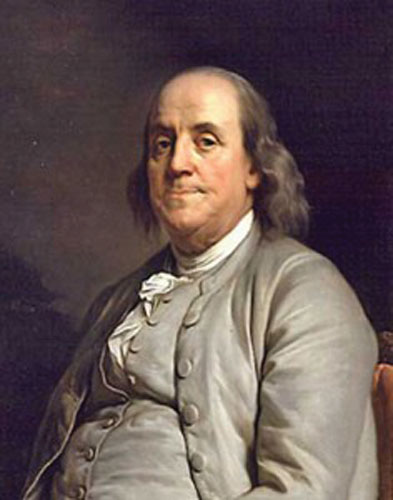.jpg)
In addition to his lasting contributions to science and government, the American founding father Benjamin Franklin (1706-1790) also managed to posthumously influence Jewish thought and practice by way of his famous Autobiography. In that work, Franklin briefly discussed a method he had devised for overcoming his undesirable habits and becoming more virtuous. Inspired by this account, the early maskil (Jewish enlightener) Rabbi Menahem Mendel Lefin of Satanow (1749-1826) decided to compose Sefer Heshbon Ha-nefesh (The Book of Spiritual Accounting, 1808), a Hebrew self-improvement guide that is still studied in yeshivot today.
Franklin’s Autobiography and Lefin’s Spiritual Accounting both put forward year-long, quarterly-repeated self-reform programs that focus on 13 character traits. Each trait is given a week of close attention, and daily journaling—in a grid chart that has the seven days of the week running horizontally and the thirteen desired traits running vertically—is used to monitor growth and progress. After 13 weeks the cycle begins again, so that over the course of a year each trait is carefully worked on for four weeks. The traits outlined for improvement in both texts, though not identical, largely overlap, as does the emphasis on acquiring positive habits, and overcoming undesirable ones, gradually and systematically.
Franklin concentrated on the virtues of temperance, silence, order, resolution, frugality, industry, sincerity, justice, moderation, cleanliness, tranquility, chastity, and humility. Lefin offered a similar list by way of illustration, but urged his readers to select behavioral traits that were relevant to their unique circumstances and personalities.
The form of Franklin’s weekly chart
Franklin devised his moral-improvement method when he was in his twenties, and had originally intended to compose a book elaborating on it. In the Autobiography he laments that due to his many other concerns, this task was never accomplished: “I should have called my BOOK the ART of Virtue . . . But it so happened that my Intention of writing & publishing this Comment was never fulfilled . . . the necessary close Attention to private Business in the earlier part of Life, and public Business since, have occasioned my postponing it . . . [and] it has hitherto remain’d unfinish’d.”
Nearly 20 years after Franklin’s death, and half way across the world from Philadelphia, Rabbi Menahem Mendel Lefin of Satanow published his own book based on the Autobiography’s self-improvement method. However, instead of this being a work for the use of the “Virtuous and good Men of all Nations,” whom Franklin had envisioned as his audience, Lefin’s Spiritual Accounting was written for the religious and moral edification of his fellow Jews.
Although Lefin never claimed that the technique he presented was his own invention, he did not disclose to Spiritual Accounting’s readers that Franklin was its source. He explained only that “a few years ago a new technique was discovered, which is a wonderful innovation in this task [of overcoming one’s animal nature], and it seems its mark will spread as quickly, God willing, as that of the innovation of the printing press, which has brought its light to the world.”
It is not certain why Lefin took such an approach. David Shahar, in his Hebrew essay “Benjamin Franklin’s influence on the approach to character improvement in R. Menahem Mendel Lefin’s Sefer Heshbon Ha-nefesh” (1984), has reasoned that Lefin’s acknowledgment of Franklin’s role was done only “partially and through hinting and without attributing his source” because “perhaps he was concerned that revealing the source of his inspiration might prevent the book from receiving rabbinic approbation.”
Nancy Sinkoff has suggested a similar explanation in her essay “Benjamin Franklin in Jewish Eastern Europe: Cultural Appropriation in the Age of the Enlightenment” (2000): “Addressing a traditionally-educated Jewish audience, Mendel Lefin did not disclose the gentile source of the method of moral self-reform, but he did acknowledge that it was not his innovation.”
Lefin saw Franklin’s method as filling a void in contemporary Jewish teachings. In Spiritual Accounting, he expresses disappointment that the rabbis of previous generations had not provided more detailed explanations of the practical methods they had used in refining themselves. Happily, however, Franklin furnished just such an account in his Autobiography. Confident that Franklin’s method could benefit all who were interested in self-improvement, Lefin determined to adapt it for a Jewish audience.
Franklin’s approach to religion made for a smooth adaptation. In the Autobiography, he explains his intention to make his system for self-betterment universally accessible: “It will be remark’d that, tho’ my Scheme was not wholly without Religion there was in it no Mark of any of the distinguishing Tenets of any particular Sect. I had purposely avoided them; for being fully persuaded of the Utility and Excellency of my Method, and that it might be serviceable to People in all Religions, and intending some time or other to publish it, I would not have any thing in it that should prejudice any one of any Sect against it.”
As Franklin assumed a generic religious approach to his moral-method, there were no obstacles preventing its development within a Jewish context. Lefin was able to adjust Franklin’s system, expand upon it, and publish it as a book for Jewish readers, in the process furthering Franklin’s initial goal of making his system for self-examination and character improvement “serviceable to People in all Religions.”
A longer version of this article appeared in Philalethes: The Journal of Masonic Research and Letters.
By Shai Afsai










